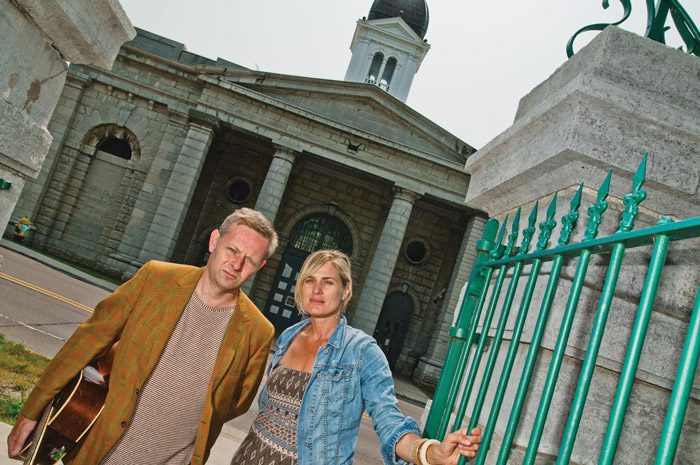“Why are you bothering to do good for people who have done so much bad?”
As the founder of Pros and Cons, a pilot program that gives musical mentorship to prison inmates, Hugh Christopher Brown has put a lot of thought into this question. Ultimately for him, the answer comes down to one guiding principle.
“I don’t feel that a single atrocious act should eclipse an entire human being,” Brown said. “You build a relationship [with a prisoner,] and very often, that’s exactly what’s lacking from [the lives of people] who end up doing something narcissistic, tragic, violent, and stupid that lands their ass in jail.”
Many would tend to agree with Brown in theory, but projects that meaningfully enrich the lives of prisoners are rare, and with limited financial resources available, few are willing to take the initiative to actually go out and implement them. In 2010, the numbers of those projects dwindled even further when the Conservative government went forward with a plan that shut down six rehabilitative prison farms around Canada at which inmates had the opportunity to do agricultural work during their sentences. One of them was Pittsburgh Institution, located just outside of Kingston and near Brown’s studio on Wolfe Island. With this crucial activity in their lives taken away, Brown saw the opportunity to step in and provide an alternative.
“I didn’t think that a benefit or a cause record would necessarily be effective because convicts sponsor little public sympathy,” Brown explained. “So I just decided to get inside and do something positive.”
Launching Pros and Cons was one significant step in a long musical journey for Brown. He played classical music growing up in Toronto and played in rock bands during high school, including the Bourbon Tabernacle Choir, which lasted on the road for 10 years. Since then he’s been living mostly in New York, both creating his own music and playing/producing for other artists, including The Tragically Hip and the Crash Test Dummies.
At the outset of the program, Brown was starting from scratch, unaware of anything similar that could provide him with a template to follow. As he describes, Pros and Cons is more focused on giving the creative process a space to happen than adhering to some sort of rigid structure.
“It’s a collaboration with largely myself and the inmates, but I’ve brought in a lot of other musicians and artists to kind of share their experience and songs, so it can change depending on who’s present,” Brown explained. “Sometimes it’s sharing songs, or it’s about musical theory. There’s been a lot of engineering and production work because the guys all had to learn to set equipment up and then tear it down because we have to empty the chapel every week.”
The growth and direction of the program are largely a product of the response from the Pittsburgh inmates—which has been overwhelmingly positive.
“The first session I ever did in there was supposed to be 45 minutes and it turned into two and a half hours,” Brown recalled. “Everybody had notebooks, poems. Once we started, it just was like a floodgate [….] There was so much writing and so many people who wanted to be involved that I just kind of kept up regular sessions and by the end of it, we had an album recorded entirely in prison.”
Brown is referring to Postcards From the County (2014), a 12-track collection of folk-centric original songs and covers, with proceeds going to various charities and restorative justice victim support causes. It was recorded over the course of a year, although Brown has been going into the prison for about two and a half years in total now. Pros and Cons is something he’s coordinated as a volunteer, and he’s often had to provide funding for it out of his own pocket. He hopes that the model that he’s established can continue to succeed and potentially spread.
“What I’m doing right now is accruing a team of people who want to do it in different places,” Brown shares.
However, he worries that the Canadian government is looking to rationalize privatization of the prison system, and won’t be likely to help enable a program that could probably benefit the country from a financial standpoint.
“I would argue that if you started a program like this nationally, you’d be saving money because incarceration rates [and recidivism] would go down,” Brown explained. “This civilization has to take responsibility for itself beyond warehousing human beings, and beyond just our acceptance of collective punishment.”
Especially having produced results on a micro scale already, Brown knows firsthand how beneficial something like Pros and Cons can be for an individual.
“There was this one inmate who wouldn’t come out of his cell for over a year unless he was ordered to,” Brown said. “And they all thought that he was done for. The [inmate] was one of the most enthusiastic proponents of the program, who exposed himself to be incredibly gifted on the guitar, and then he just started practicing and practicing and mentoring others to do the same.”
With Pros and Cons, the music and positivity are present in Pittsburgh; hopefully more penal systems decide to start playing along.









thanks sam! CB
everyone- the music is given for free at the site, with suggested donations to charities and victim’s support